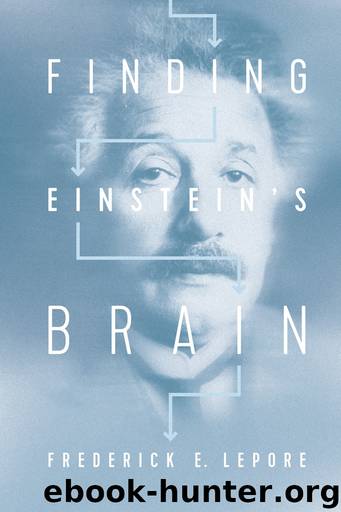Finding Einstein's Brain by Frederick E. Lepore

Author:Frederick E. Lepore
Language: eng
Format: epub
Publisher: Rutgers University Press
CHAPTER 7
The Pursuit of Genius
We do not know how or why genius is possible, only that—to our massive enrichment—it has existed, and perhaps (waningly) continues to appear.
—HAROLD BLOOM, Genius
In 2000 when I embarked on what would prove to be a haphazard program of research on Einstein’s cerebrum, I posed a straightforward question: “Why does Einstein’s brain exert such irresistible attraction for neuroscientists and people from all walks of life?”1 My explanation for the unflagging interest in a brain preserved in formalin for over six decades was, and still is, best encapsulated in a single word—genius. And as we seek to understand what makes a genius tick, is there any more promising place to begin than with “the twentieth century icon of genius, Albert Einstein?”2
On the surface, I answered a simple question with a breezy answer, to be sure … but just how do we go about defining genius?
In this book about a brain, I must own up once again to the problems that inevitably arise when discussing one of the highest attainments of the human mind—genius. My default stance as a neurologist is that the brain has a lot to do with the mind, but this chapter does little or nothing to bridge the explanatory gap separating brain science and mind science (of which genius is a topic par excellence). So why read on? I can only presuppose that you are turning these pages because of your interest in: A) Einstein, B) brains, or C) genius. C now takes the stage, front and center, because it is emblematic of our personification of Einstein, it is a scarce and remarkable outcome for the human condition, and even if we disregard neuroscience with the concession that “a materialist definition of genius is impossible,”3 we are transfixed by it. Why?
Pick your favored cultural “carrots” (as opposed to “sticks”) along the lines of “fame, fortune, and happiness,” and it won’t be long before you seize upon genius as an effective means of grabbing a bunch. Genius as practiced by Einstein or Shakespeare can leave an indelible imprint on posterity (fame). Genius wielded by the likes of Steve Jobs or Bill Gates can lead to the accrual of staggering wealth (fortune). The happiness part of the genius triad is a little more uncertain and problematic … as in tortured geniuses. The psychologist Kay Redfield Jamison studied the incidence of mood disorders and suicide in thirty-six English and Irish poets born from 1705 to 1805. Byron, Keats, Shelley, Wordsworth, Samuel Johnson, Coleridge, and Blake were among these creative geniuses, and their mental health “scorecard” was discouraging—more than half suffered mood disorders, two committed suicide, and four were institutionalized in asylums.4
Okay, two out of three isn’t bad … and there are undoubtedly some happy and emotionally stable geniuses. For example, Einstein told C. P. Snow that “in his experience, the best creative work is never done when one is unhappy.”5 Emotional storm warnings aside, genius is simply an important subset of global cultural imperatives. Just ask the Tiger Mom sending junior to the “Mozarts and Einsteins” preschool.
Download
This site does not store any files on its server. We only index and link to content provided by other sites. Please contact the content providers to delete copyright contents if any and email us, we'll remove relevant links or contents immediately.
Periodization Training for Sports by Tudor Bompa(8247)
Why We Sleep: Unlocking the Power of Sleep and Dreams by Matthew Walker(6693)
Paper Towns by Green John(5174)
The Immortal Life of Henrietta Lacks by Rebecca Skloot(4571)
The Sports Rules Book by Human Kinetics(4377)
Dynamic Alignment Through Imagery by Eric Franklin(4205)
ACSM's Complete Guide to Fitness & Health by ACSM(4048)
Kaplan MCAT Organic Chemistry Review: Created for MCAT 2015 (Kaplan Test Prep) by Kaplan(3998)
Introduction to Kinesiology by Shirl J. Hoffman(3762)
Livewired by David Eagleman(3761)
The Death of the Heart by Elizabeth Bowen(3601)
The River of Consciousness by Oliver Sacks(3592)
Alchemy and Alchemists by C. J. S. Thompson(3509)
Bad Pharma by Ben Goldacre(3419)
Descartes' Error by Antonio Damasio(3270)
The Emperor of All Maladies: A Biography of Cancer by Siddhartha Mukherjee(3140)
The Gene: An Intimate History by Siddhartha Mukherjee(3091)
The Fate of Rome: Climate, Disease, and the End of an Empire (The Princeton History of the Ancient World) by Kyle Harper(3055)
Kaplan MCAT Behavioral Sciences Review: Created for MCAT 2015 (Kaplan Test Prep) by Kaplan(2979)
